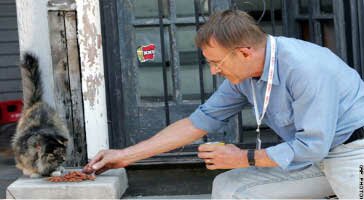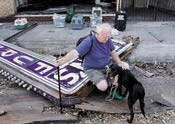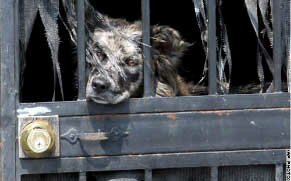
CYRANO'S JOURNAL®
27-Oct-07, 01:05 PMBest Friends Need Shelter, TooBy Karen Dawn
|
http://www.cjonline.org
ALL RIGHTS RESERVED, 2005 CJONLINE.ORG & SPECIFIC AUTHORS. PLEASE SEE OUR COPYRIGHT NOTICE.
|
Saturday, September 10, 2005 As bereft as the next human.
The week after Hurricane Katrina hit, the media covered the thousands of low-income people trapped for lack of means to get out. Almost two weeks later, thousands still hadn't left, in many cases because official policy would not accept the bond between people and their nonhuman family members. Members of a frustrated rescue team simplified it for a "Dateline" news crew: They said people were refusing to be evacuated simply because "they won't leave their pets."
There is a class issue involved here. While Marriott hotels welcomed the pets of Katrina evacuees as "part of the family," people who had to rely on the Red Cross for shelter were forced to abandon that part of the family or attempt to ride out the storm. It cannot be denied that many poor people are dead as a result of "no pets" policies.
The Los Angeles Times reported on Patricia Penny, who wondered whether her son Billy had survived. She had begged him to leave, but he was afraid to abandon his animals. CNN showed the rescue of a family, including a dog, sitting on a rooftop as a boat pulled up. The boat left without the dog. Staying with a dog and risking their own lives is not an option for people who have children to provide for. The parents were given no choice but to abandon the dog, and to break their children's hearts. As they pulled away they all watched their trusting, confused and terrified canine family member alone on the roof.
At Red Cross shelters there are families that have lost their homes and all of their possessions but are thanking God that they are all safe. Others are frantic, unable to think of anything besides the slow deaths of beloved companion animals they were forced to leave on rooftops or at bus boarding points. One woman, with no other possessions left, offered her rescuer the wedding ring off her finger to save her dog, to no avail.
A young boy carried a dog in his arms as he tried to board a bus to the Houston Astrodome. Dogs were not allowed. The Associated Press story reported that "a police officer took one from a little boy, who cried until he vomited. 'Snowball, Snowball,' " he cried." In a similar story, an old woman, traveling alone except for the poodle in her arms, was forced to leave him behind to wander the streets. We have read other stories of elderly people forced to choose between their lifesaving medications or their life-affirming pets. CNN's Anderson Cooper even reported on a woman, legally blind, who for 10 days had been told that she could not take her service dog with her if she was evacuated. She had stayed put until the CNN cameras arrived and the police relented.
The pets pulled from people's arms would not have taken seats meant for humans. There is no reasonable explanation for abandoning them. They were the last vestiges of sweetness, in some cases the only living family, of those who had nothing left. But the police officers were just following orders -- orders that reflect an official policy inconsistent with how people feel about their animals.
Red Cross shelters that do not have animal-friendly areas, or do not coordinate with humane groups to make sure that there are animal shelters nearby, are out of touch with the needs of a society in which 60 percent of families have pets and many view them as intrinsic members of the family.
Born in the US, Karen Dawn grew up and studied in Australia. She worked as a news researcher and writer for various Australian publications and on ABC's nightly news magazine, "The 7:30 Report." Living in New York in the 1990s, Karen worked every Sunday for six years at the Saint Francis of Xavier soup kitchen. But after reading Animal Liberation in 1998, she was moved to devote herself to helping those most abused by society and least able to help themselves -- members of other species. Drawing on her knowledge of the media, she founded DawnWatch in November 1999.
This article originally appeared on 9.10.05 in The Washington Post.
RELATED ARTICLES:
SHAMEFUL POLICY CAUSED MANY PETS' DEATH Karen Dawn |
||||||





